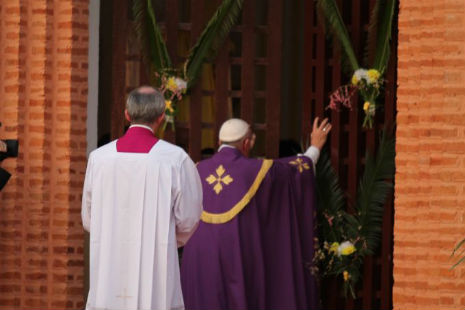‘The Pope opened the doors and knocked down the walls’
“We owe the peace we are currently enjoying to the Pope,” declares Saoudi Abdouraman Dodo, a spokesman for the Muslim community in Bangui.
Feb 19, 2016

CENTRAL AFRICAN REPUBLIC: “We owe the peace we are currently enjoying to the Pope,” declares Saoudi Abdouraman Dodo, a spokesman for the Muslim community in Bangui. Everyone here attributes the calm in the Central African Republic to Pope Francis’ visit on November 29-30, 2015.
On the last leg of his African journey, after Uganda andKenya, the Pope “opened the doors and knocked down the walls,” explains Fr JésusMartial, Vicar General of Bangui. He opened the holy door of Bangui Cathedral to launch the Jubilee Year of Mercy. “Then he said Mass for the consecrated before going outside to stand in front of the Cathedral. Anybody could have killed him. The crowd of young people gave him an ovation.”
At dawn the next day, the Pope went to the central mosque in Bangui, in the PK5 district, where he was also acclaimed. “He entered with the Christians and went out with the Muslims,” recalls Fr Martial, referring to the procession of local residents who escorted him from the Muslim district to the “stadium seating 20,000 people” for a Mass.
Ahamat Deliris, a member of the Central African Islamic Committee, summed up the event: “We followed him to the stadium. Then he spoke. We listened to him and since then, everything is back to normal.” He has not forgotten “the 476 mosques destroyed by the anti-Balaka fighters,” but he notes that business has started up again in PK5, “the commercial centre of Bangui.”
“He liberated us. Ever since his visit, we are free to move about in the capital. He made our Christian brothers understand that we have a place in Central Africa. Before his arrival, we were all in favour of the visit, by the way,” declares Saoudi Abdouraman Dodo.
On the other hand, French diplomats, and military officials in particular, were not enthusiastic about it: they dreaded the danger to the Pope and the local population. EU ambassador Jean-Pierre Reymondet-Commoy remembers those two days well.
Today, Ambassador Reymondet-Commoy says the Pope “gave an impetus that will enable elections to run smoothly from now on. The ovation that awaited him in the stadium and greeted the imam who was with him, was striking. The man took personal risks. The popemobile cobbled together by the Minusca, the UN stabilization mission in Central Africa, demonstrated his humility in this country where nothing is luxurious.”
Bishop Thaddée Kusy of Kaga-Bandoro, a Polish-born Franciscan who has been living in Africa since 1979, watched the Pope’s visit from the inside. He emphasizes “the physical courage it took to come here, in the heat, for a man almost 80 years of age.” And he admires the way he con-ducted himself: “He didn’t simply give speeches. He gave himself to the people. At the lunch he shared with us after his visit, you could see that the sleeves of his cassock were soiled up to the elbows. He’s a prophet.” The Pope has shown “it is possible to live together in peace,” the bishop continued.
Not everything is settled yet in Central Africa. The next day, “a Muslim was murdered. We per-suaded our young people not to retaliate. It was a chance to show our Christian brothers that we don’t want the conflict to continue,” explained Saoudi Abdouraman Dodo. With a few simple gestures, the Pope made it understood that peace was better than war. -- Global Pulse







Total Comments:0